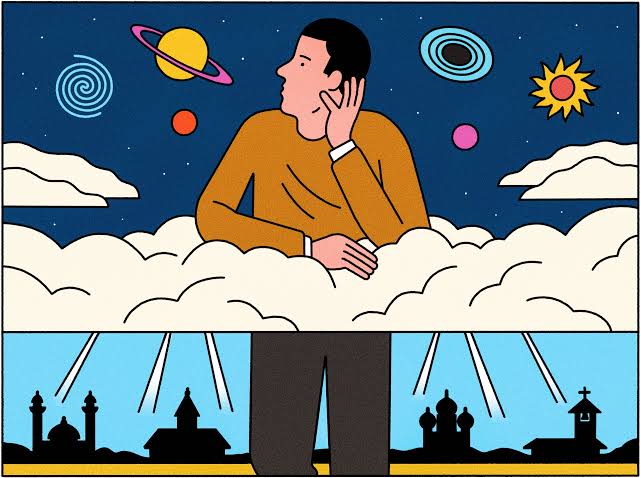
The word agnostic translates to ‘without knowledge’ in Ancient Greek- which captures the essence of agnosticism. It is the idea that the existence of any divine being is unknown. Used interchangeably with the term ‘atheism’ by those less well-versed in the vernacular of religion, which is the explicit disbelief in God, agnosticism chooses to gently point out that if you can’t prove it, then you can’t accept it as a fact.
Agnosticism shouldn’t be dismissed as commitment-phobia towards religion. It allows enough breathing space from the various extremes, contradictions, and head-spinning loopholes, but not complete detachment or rejection of any omnipresent deity reading this right now.
God is a hypothesis. This is the era of science and technology where modernity and evolution spare nothing, not even religion. Spotting the fatal cobwebs on the creeds and doctrines of their elders, a huge section of the youth can no longer believe without any rational explanation or justification. ‘Rebels’, ‘infidels’, ‘confused munchkins’- many young adults identify as agnostics and atheists who cannot follow the traditions and cultures of their parents and grandparents, no matter what the cost may be, and it can cost you a lot. At the very least, an awkward silence when you refuse to even half-heartedly mumble a prayer at a festival and the cutting off of ties at the very worst.
Religion has its undeniable value to any community. Put simply, much like raising a child, or a group project, or any common cause, it unites (and divides) us based on one key factor: faith.
Growing up agnostic in a deeply religious household makes you question your individuality. In a country that has a calendar dispersed with religious holidays, an agnostic struggles to articulate their views- everyone, believer or not, savours the family functions and feasts. Agnostics and atheists are thrown into this world of devotion and tradition that they cherish and enjoy for every reason but religious faith.
Indian society is one that thrives on a sense of community. Cadbury and Microsoft ads got this part right- religious events do bring the entire family together. Unconventional beliefs of any genre, especially in the context of religion, give society enough reason to raise an eyebrow and thus agnostics find it easier to veil their opinions behind omission and silence rather than facing scrutiny and persecution. It is easier to be a silent participant than a vocal outcast.
Families hardly discuss religion, considering it to be an ornament that will be inevitably adorned through the generations. The lack of open dialogue has only widened the chasm between the two factions of God’s audience.
Hiding one’s true beliefs (or disbeliefs) from family and friends creates an uncomfortable environment where stigma and guilt taint every familial interaction, leading to such individuals feeling marginalized. Agnostics are force-fed faith and their desire for religious freedom is quelled by the fear of exclusion.
Agnostics are flexible- they do not reject the postulation but refuse to accept it without any objective evidence. It is the Switzerland of religious beliefs- it is neither dismissing nor adopting beliefs. Although they are completely accepting of the perspectives of others, they also find peace in acknowledging the uncertainty of it all.
Simply put? You can’t convince every millennial to ignore the elephant in the prayer room.
Written by Anushka Das for MTTN
Edited by Mihika Antonia Dean for MTTN
Featured image by Seb Agresti (The New Yorker)
Artwork by Javier Zarracina (Vox)

Leave a Reply
You must be logged in to post a comment.